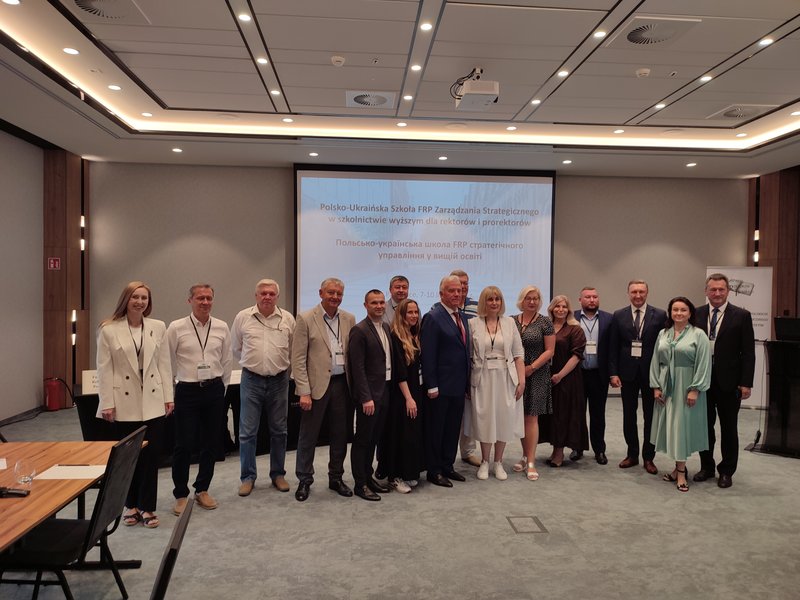Institutional cooperation and exchange of experience.
From July 7 to 10, an important event took place in Pabianice, Łódź, Poland — the Polish-Ukrainian FRP School of Strategic Governance in Higher Education: XXVII School of Strategic Governance in Higher Education for Chancellors and Bursars / Financial Directors.

The school is organized by the Polish Rectors Foundation.
On the first day, the School was opened by the leader of the Polish Rectors Foundation and head of the delegation of Polish rectors, Jerzy Woznicki; on the Ukrainian side, the rectors’ delegation was led by Stanislav Nikolaienko. Viktoriia Hurochkina, leader of the Ukrainian Science Diaspora in Poland, was invited as part of the Polish delegation and represented the interests of Ukrainian researchers in Poland.
Within the framework of the strategic school, participants discussed the demographic crisis and human capital, the key challenges facing higher education, and new approaches to training undergraduate and postgraduate students, including innovative teaching methods and performance assessment.
With the aim of developing strategic cooperation between the Rectors’ unions of the two countries, Addendum No. 3 to the Tripartite Agreement KRASP-FRP-ZRUU for the III cycle PP-U (2025–2027) was signed by Stanislav Nikolaienko, Arkadiusz Mezghik, and Jerzy Woźnicki, which specifies the main objectives of the activities:
- Joint activities of KRASP (Konferencja Rektorów Akademickich Szkół Polskich – Conference of Rectors of Polish Academic Universities) and the Union of Rectors of Ukraine to enhance Ukraine’s higher education system by implementing necessary reforms and adapting the system to the new conditions of the ongoing war, with a view toward its resolution, and drawing on shared experience in the governance of higher education institutions;
- Exchange of information on addressing or mitigating the consequences of resource shortages in the higher education sector of both countries (financial capital, human resources, research infrastructure, tools for supporting international cooperation, etc.);
- Updating strategic documents on the development of higher education in both countries, taking into account the European perspective;
A meeting was held with A. Sheptytskyi, Deputy Secretary of State of the Ministry of Science and Higher Education, on the strategic development of the Ukraine–Poland partnership in education.
The main topics of the speeches and discussions were:
- Challenges, opportunities, and constraints of Polish economic and academic institutions’ involvement in the reconstruction of Ukraine (Krzysztof Pietraszkiewicz, Warsaw University of Technology);
- Models of educational process organization. Is there a risk of increasing inadequacy in higher education institutions? (Eva Khmelovska from SGH, who emphasized the importance of aligning Ukrainian higher education institutions with EU standards);
- Micro-credentials in Europe, in Poland, and at universities – from theory to practice. International approaches to organizing education (Andrzej Krasniewski);
- World: the impact of artificial intelligence (AI) on the research process (Wlodzimierz Dombrowski);
- Trends and solutions in (language) education in the AI era (Agnieszka Gibel);
- Methodology of teaching law: challenges and expectations (Monika Kulesha-Chuprin);
The following panel discussions deserve special attention:
- “Challenges and New Solutions in the Educational Process in Higher Education and Doctoral Training.” Moderated by Jerzy Voznicki; panelists included Lukasz Bogucki, Jakub Brduliak, Michal Klimchyk, Kevin Levytsky, and Alla Rybalko.
- “Poland–Ukraine: Perspectives on New Relations and Activities.”
- “Poland–Ukraine: Perspectives on New Relations and Joint University Activities of Both Countries in the Face of New Challenges.” Moderated by Andrzej Sheptytskyi; panelists: Jerzy Lis, Stanislav Nikolaienko, Bogusław Pacek, Ihor Tsependa, Janusz Uriash.
- A meeting with Zofia Savitska regarding the diversity of NAWA programs.
We sincerely thank Iryna Dekhtiarova for the invitation and professional organization of the event!











